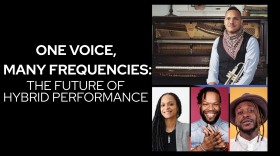-
Virtual
The Medicated Appetite: How GLP‑1s Are Reshaping the Food System
The rise of GLP‑1s raises deep questions: What happens when medication becomes one of the most effective ways to navigate a food system built around overconsumption? How might these drugs change what we eat, how companies design and sell food, and the broader incentives that shape our choices?Partner:Cambridge Forum -
Women War Workers at Raytheon, 1941-1945
Chet Michalak, Raytheon historian and archivist, tracks women's participation in U.S. labor in this lecture.Partner:Charles River Museum of Industry & Innovation -
ONE VOICE, MANY FREQUENCIES: THE FUTURE OF HYBRID PERFORMANCE
One Voice, Many Frequencies brings together boundary-pushing artists, educators, and cultural leaders to explore how contemporary solo work is breaking down the walls between music, theater, and storytelling, and what that means for artists and audiences right now.
At the center of the conversation is Ahamefule J. Oluo, whose acclaimed solo performance The Things Around Us blends live trumpet, looping, humor, and storytelling to explore identity, memory, and connection. Their work is known for its emotional range, musical sophistication, and ability to transform deeply personal material into shared experience.
Oluo is joined by artists who represent a creative core of Boston’s music and performance scene as performers, builders of platforms, communities, and futures: Amanda Shea, Tim Hall, and Cliff Notez.
Rooted in lived artistic practice and real-world experimentation, One Voice, Many Frequencies offers a rare look at how solo performance is being reimagined right now by artists who are making the work shaping scenes, building communities, and inspiring the next generation of performers. -
In Person
The Point: Shakespeare's Radical Stage
This program explores Shakespeare’s radical influence across time and place. We’ll trace how his language and political vision helped inspire the rhetoric of the American Revolution, even echoing in the Declaration of Independence. We’ll consider the historical forces that transformed Shakespeare into a cultural authority whose work could be enlisted for causes of liberation, often speaking to those on the margins of power. And we’ll look far beyond the eighteenth century to moments when Shakespeare became a clandestine ally, such as his use by the French Resistance during World War II to carry coded messages of defiance.Partner:ArtsEmerson -
Digging Deeper into Black Voices of the Revolution: A Conversation with Angela Tate & Dr. Nedra Lee
Chief Curator and Director of Collections at MAAH, Dr. Nedra Lee, will discuss the process of assembling and curating the Black Voices of the Revolution exhibit currently running at the museum.Partner:Museum of African American History -
Dr. Joy Banner: From Plantation to Pollution
How did the legacy of plantation slavery shape today’s environmental crises? Dr. Joy Banner will trace the “plantation to pollution” through line—from sugarcane cultivation built on extractive enslaved labor to the modern fertilizer and pesticide industries that now pollute the land, air, and water of Black communities along Louisiana’s Mississippi River corridor, often called "Cancer Alley."Partner:Ford Hall Forum -
Josh Shapiro: Where We Keep the Light
Josh Shapiro, Governor of Pennsylvania, sat down with former news editor Marty Baron to discuss a life in politics, as outlined in his new book, "Where We Keep the Light: Stories from a Life of Service."Partner:JCC Greater Boston -
Skating on Thin Ice: The Geopolitics of Greenland and the Arctic
The same forces driving tensions in South America - rich mineral resources, strategic one-upmanship, and shifting trade and military alliances - are now flaring in the far north. Cambridge Forum brings together Arctic geopolitical specialists to explore the key issues at stake in this rapidly changing territory.Partner:Cambridge Forum -
U.S. Engagement with Africa
This lecture will examine the evolution of U.S. engagement with Africa by critically comparing decades of aid-led diplomacy with an emerging emphasis on trade, investment, and commercial partnership.Partner:WorldBoston -
Why are Workers’ Stories Missing at Historic Sites?
The labor movement in the United States has been a bulwark of democracy and a driving force for social and economic equality. Yet the stories remain largely unknown to Americans.Partner:Charles River Museum of Industry & Innovation









